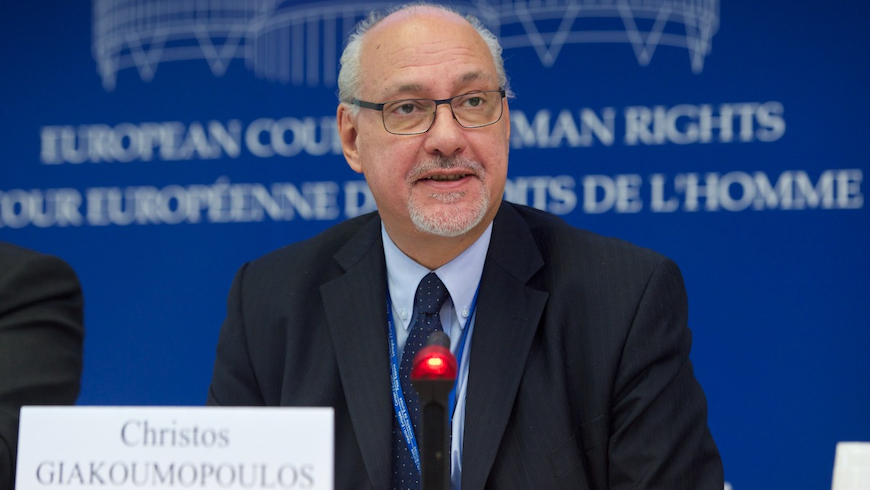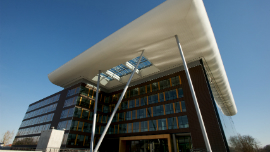Opening statement by Mr. Philippe Boillat
Conference on "Shaping the digital environment – ensuring our rights on the Internet"
Graz, 13 March 2014
Mr President Majcen, Mr Secretary General Linhart, Mayor Nagel, Excellencies, dear colleagues, dear friends, it is an honour and a real pleasure for me to stand before you to open on behalf of Secretary General Jagland this Conference.
I would like to extend my warmest gratitude to the Austrian authorities for taking the initiative to organise this Conference in the framework of its chairmanship of the Committee of Ministers. I would also like to sincerely thank the Government of the Land of Styria for generously agreeing to host us here in Graz. Thanks are also due to our good friends in the European Training and Research Centre for Human Rights and Democracy for their excellent collaboration in the preparation of this very important event in the Council of Europe’s calendar of activities.
Standing in this beautifully renovated hall which once housed one of the great libraries of the University of Graz and for most of the 20th Century held the provincial archives, I am struck by just how appropriate it is to assemble here to discuss our Rights on the Internet. The quest for knowledge and the necessity to freely exchange information and ideas without borders or barriers are today amongst the most crucial issues worldwide.
In November 2011 - as just underlined - at the Vienna Diplomatic Academy, the Federal Ministry for European and International Affairs of Austria and the Council of Europe brought together eminent experts for the Conference “Our Internet - Our Rights, Our Freedoms: Towards the Council of Europe strategy on Internet governance 2012-2015”. That Conference set the stage for the development of the Council of Europe’s Internet Governance Strategy which was adopted by the Committee of Ministers on 14 March 2012.
On behalf of the Secretary General of the Council of Europe, I must pay tribute to the Austrian authorities for its un-wavering support of the Strategy. I am delighted that Ambassador Thomas Hajnoczi who was the Committee of Minister’s Thematic Co-ordinator on Information Policy at the time of the adoption of the Strategy will moderate the closing Panel which will look at the issues the next Strategy for the years 2016-2019 should address.
The President of the CM, Minister Kurz, in his address of 27 January 2014 to the Parliamentary Assembly of the Council of Europe, set out Austria’s thematic priorities for its Chairmanship. The first was freedom of expression, the second, protecting rights on the Internet. The two are inextricably linked. Minister Kurz stressed how, I quote “The Internet is an open forum and it is not just for young people. However, open does not mean outside the law. We should not ignore infringements of human rights and fundamental democratic principles on the Internet. The right to respect for privacy, for instance, is absolutely crucial. No country or company should be allowed, without clear legal basis or special authorising measures, to collect data on Internet users and use them without their knowledge. “
Our Internet Governance Strategy puts forward a balanced approach to security and freedom in cyberspace.
For the Council of Europe protecting individuals’ human right to security means:
- fighting cyber-crime;
- ensuring public security, preventing terrorist use of the Internet;
- protecting public health, in particular in combatting the counterfeiting of medical products;
- protecting the rights of the child, by supporting criminal law measures against the sexual exploitation and abuse of children;
- preventing and controlling criminal money flows through the Internet.
For all these issues, the Council of Europe has relevant Committees with monitoring mechanisms.
Reconciling security and freedom on the Internet is not always easy. However, no efforts should be spared to get it right. When States are unsure they should err on the side of freedom.
Ensuring individuals’ freedom means among other things:
- protecting their right to freedom of expression in line with article 10 of the ECHR as interpreted by the ECtHR;
- protecting the right to private life in compliance with article 8 of the ECHR;
- protecting the right to freedom of association in accordance with article 11 of the ECHR
Tomorrow we enter the second year of the Strategy and even for the fast moving world of the Internet, the changes we have seen in these past two years are staggering.
Perhaps 2013 will be remembered as the time we all became aware of ‘big data’. The huge amount of data – often very private data - that are recorded or logged by global businesses that have become household names, with - but also very often without - either our knowledge or our informed consent.
It is also during this period that we became acutely aware of how governments across the globe have taken an interest in these data and have gone to great lengths to harvest them – and certainly not always with the consent of the user.
Can privacy still exist in our daily lives?
Human Rights apply on-line just as they apply off-line. The 47 Member States of the Council of Europe have committed to maximising these rights while minimising restrictions. For the Council of Europe this means promoting an Internet based on human rights, pluralist democracy and the rule of law.
The European Convention on Human Rights and the Strasbourg Court is of course the prime example.
The Convention for the Protection of Individuals with regard to Automatic Processing of Personal Data (Convention 108) was drafted before the Internet protocol follow-up was standardised, and while in need of modernisation - a complex process which is ongoing - we are proud that in its current form it gathers 46 countries (not solely European ones) and that it is still the only international treaty in the field of data protection.
The 2001 Budapest Convention aims to fight cybercrime while protecting human rights.
In carrying out the various actions proposed in the Strategy all of the Council of Europe entities are encouraged to fully engage with all stake-holders.
Excellencies, ladies and gentlemen,
Much has been done but much more remains to be done. Among the priorities of the Council of Europe I would mention the following:
-
Re-establishing trust among all actors through:
- Increased Transparency including by States, and
- Increased Dialogue between stakeholders in various national, regional and global fora
- Exploring ways to ensure that States show restraint both in law and in practice
- Increasing co-operation activities to assist States in developing Laws and practice to ensure compliance with their international human rights treaty obligations
Dear Colleagues,
This Conference is a unique opportunity to bring our collective expertise together to guide the Council of Europe member states as they implement the current Internet Governance Strategy and prepare their strategic priorities for the years 2016-2019. 800 million Europeans and many more people globally, turn to the Council of Europe to play fully its pioneering role to shape the Digital Environment, thereby Ensuring our Rights on the Internet.
I look forward to our discussions and I thank you for your kind attention.









